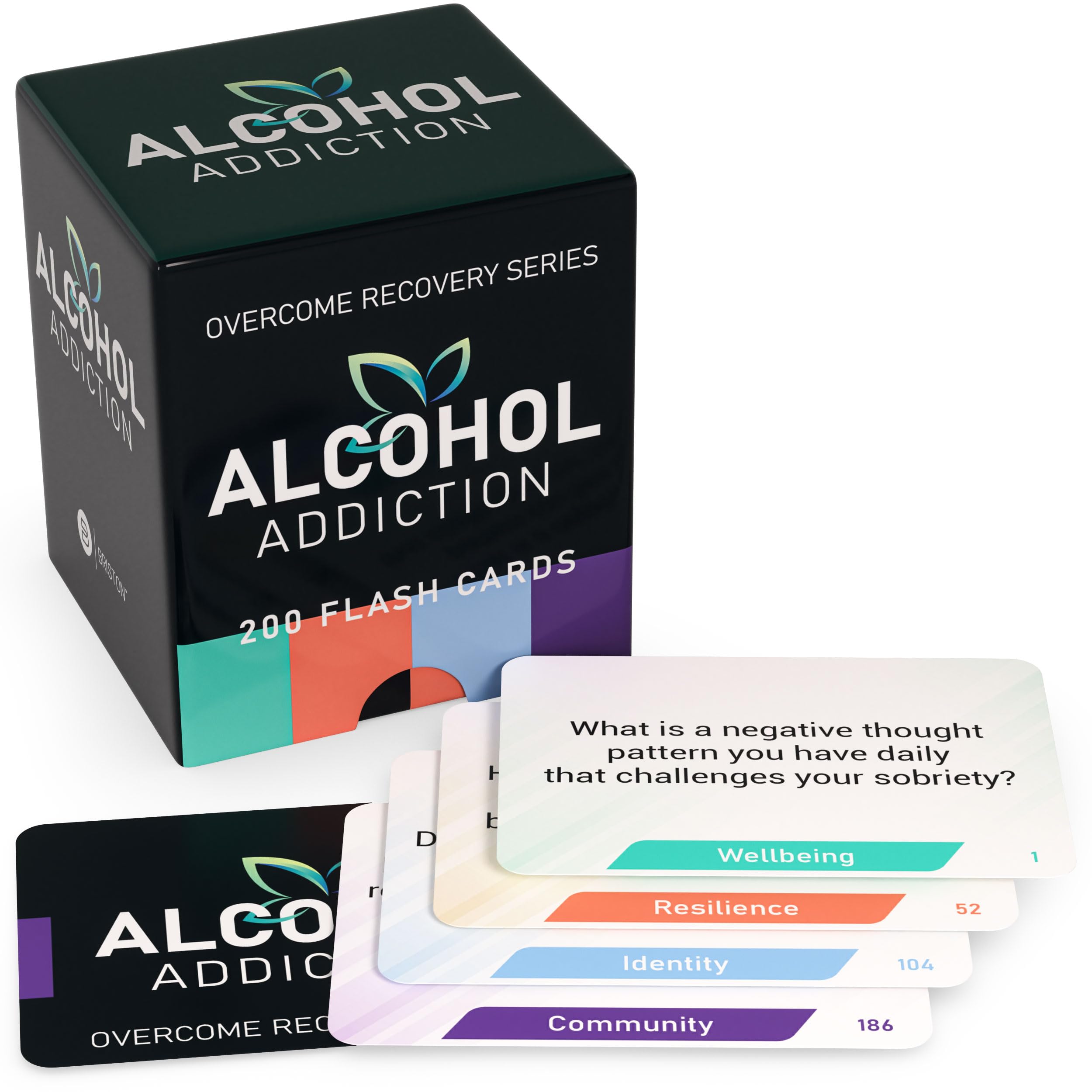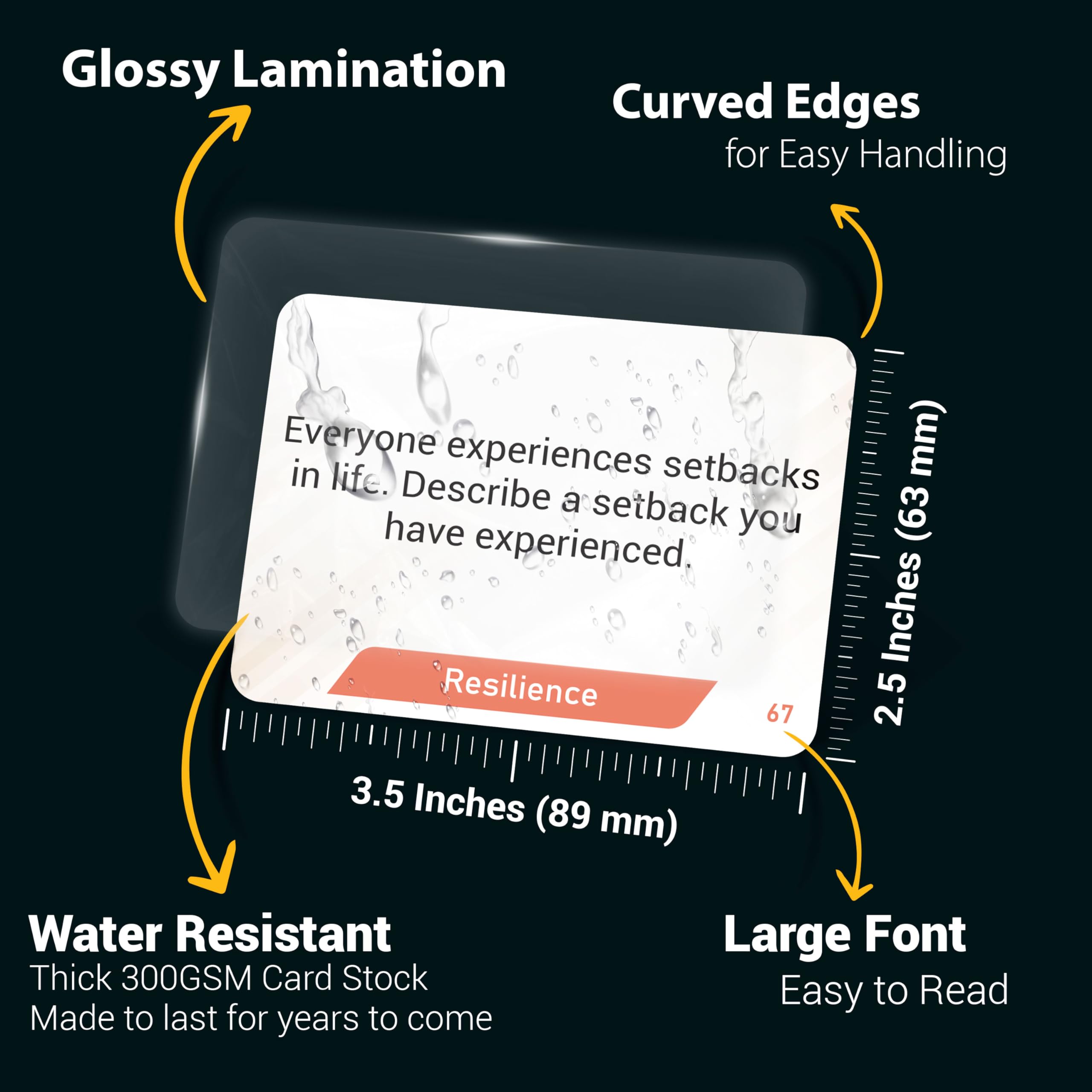









🛠️ Build Your Path to Sobriety!
The Overcome Alcohol game features 200 high-quality flashcards designed to facilitate deep conversations and self-reflection for individuals recovering from alcohol addiction. Made from durable, water-resistant material, these cards are perfect for therapy sessions, support groups, or personal use, promoting a holistic approach to recovery.
| Material Fabric | 300GSM Card Stock |
| Color | Multi Color |
| Theme | Flash Cards with Questions |
| Size | 3.5 x 2.5 Inches |
| Package Quantity | 1 |
| Item Dimensions L x W | 3.5"L x 2.5"W |
| Number of Items | 1 |
| Container Type | Box |
| Special Features | Portable, Water resistant |
Y**M
Great for therapy
I work as a nurse in an addiction clinic and these cards are great for group therapy. Lots of meaningful questions to get a good conversation flowing. Highly recommended.
A**S
Great for money!
The Overcome Alcohol – Addiction Recovery Questions Group Therapy Game is a card-based tool designed to facilitate conversations in group therapy settings. It contains 200 cards with questions that aim to help individuals struggling with substance abuse, particularly alcohol addiction, engage in meaningful discussions about their experiences, challenges, and progress. The game is intended for use in counseling, group therapy sessions, and Alcoholics Anonymous (AA) meetings, as well as for personal reflection.Key Features:Targeted Questions: The 200 cards are designed with questions that address various aspects of addiction recovery, including triggers, coping strategies, emotional health, and the process of maintaining sobriety.Versatile Usage: The game can be used in multiple settings, including therapy sessions, AA meetings, and informal group discussions. It can also be used for self-reflection.Facilitates Discussion: The questions are meant to provoke thought and conversation, making it easier for participants to open up about their experiences, which is crucial in the recovery process.Focus on Positive Mental Health: Alongside addressing the challenges of addiction, the game also emphasizes positive mental health, aiming to build resilience and encourage a supportive community environment.Pros:Comprehensive and Thoughtful Content: The questions cover a wide range of topics relevant to recovery, offering a holistic approach to discussing addiction.Engages Participants: The interactive nature of the game can make therapy sessions more engaging, encouraging participation from all group members.Flexible Application: Suitable for both professional therapists and peer-led groups, allowing for broad applicability.Cons:Group Dynamics Dependent: The effectiveness of the game may rely heavily on the dynamics of the group and the skill of the facilitator. In some groups, participants might find certain questions too personal or difficult to answer in a group setting.Potential for Emotional Intensity: Some questions may evoke strong emotions, so it's essential that the facilitator is prepared to handle intense emotional responses.Overall Impression:The Overcome Alcohol – Addiction Recovery Questions Group Therapy Game appears to be a valuable tool for fostering meaningful conversations about addiction recovery. It is particularly useful for therapists, counselors, and group leaders looking to create a structured yet open environment where participants can share and reflect on their experiences. The focus on both substance abuse and positive mental health makes it a versatile resource in promoting long-term recovery and resilience.For those facilitating or participating in addiction recovery groups, this game could provide a structured way to explore complex emotions and challenges, making it a worthwhile addition to therapeutic resources.
J**N
Great tool for addiction recovery!
These cards are perfect for starting real and meaningful conversations about addiction and recovery. The questions are very well designed and allow for some very deep and encouraging discussions. These are great for anyone who deals with addiction and has taken the step to begin recovery. Awesome product!
B**.
Conversation Starter
These cards are good for therapy sessions
J**F
Insightful, Comprehensive, covers topics for the newly sober, great for groups & professionals
Note to readers: Please know that in my review I may use the words alcoholic, addict or addiction interchangeably, as I see them mostly to be, all the same. However, that is my view and, as always, I respect your view as your own (and hopefully, you mine ;). I just wanted to make readers aware of this word use, as not to confuse anyone who reads this review.Also, I thought these cards applicable to not just the alcoholic but the addict too, as I find most material in recovery to be that way- when relating to one- just as usable with the other (although a word may need to be switched around in a question or omitted, such as saying addict instead of alcohol).My Review:I was curious to see what the Overcome Recovery Series Alcohol Addiction flashcards were like, having been in Alcohol Anonymous for most of my life- and having learned much from the program- I still want to add to my knowledge of addiction through other things, like this item.Plus, as someone who studied and worked on the crisis hotline for half a decade and Psychology for years in college, I thought these cards might prove useful in the future- and was interested to see what insight they might bring to my life and others who were in my life or might be, in the future. Even if I were to run a group in the future for addicts and/or alcoholics, these may prove to be a useful tool to check out and implement one day.Personally, I don't think there are flashcards you can play any kind of game with, they are more discussion cards, IMO, questions that lead the addict to think about their addiction and the role that everything plays in it (especially and mostly- themselves)! The cards are split into four sections: Wellbeing, Resilience, Identity and Community. The cards are also numbered on the bottom, 1 through 203, and there does seem to be an order the questions should be asked in but I don't think that the questions, necessarily, need to be asked in that order (however I would personally go in the order the cards are numbered as there does seem to be some process to what is asked in the questions, as they evolve through certain sub-topics).For instance, the first Wellbeing card asks- What is a negative thought pattern you have daily that challenges your sobriety? Card two, What have you learned about self-care since starting the recovery process and three, What steps have you taken to establish a healthy daily routine during recovery? The fourth card is like many throughout the deck in which the person who answers is asked to- Describe one way you can change a negative thought pattern in order to improve your well-being.Many of the cards don't ask a question but for the addict to describe an aspect in their lives, addiction or recovery (whatever it may be).As I read these cards, while they would be great for a person to go through by themselves, I think they would also be best for group settings. Whether the leader would go through several cards or one at a time, I think the questions these cards raise are good aspects to a person getting sober- and definitely point out questions and answers that need to be known, discussed and worked on.The Resilience cards begin at number 51 in the set and start with the question: How did you view the process of becoming sober before beginning your own recovery. Next, have your views about the recovery process changed now that you are in recovery yourself? And 53- Describe how you handled stress while you were using alcohol.Identity is the third section and starts on card number 104. The first three questions are: Describe something you learned today about yourself. What is one purpose you have planned for your life after alcohol abuse and Describe how you can achieve your purpose in life.Community begins on card 155 and ends with card 203 and is the final section. The questions seem longer on most of these cards from the previous section- and seem to dig into an alcoholic’s relationships, enlightening what is going on in their life, what is right or wrong about those relationships and what should go in, with regards to personal relationships (and community), in the future.The first four questions you are asked to- Rate your recovery support network on a scale of 1-10. Describe the people who make up your strongest supporters since starting your recovery from alcohol use. Third, describe a relationship that you find that you need to limit or avoid because that person has an unhealthy relationship with alcohol. And lastly, What steps have you taken to rebuild trust with a loved one since making the choice to live a sober life?While users can start with number one and move through the questions or start at a particular section and move through them, all those options are up to those using the cards. As I said previously, in a group setting these cards can be used in large amounts, asking several cards or covering a section in a sitting or you can ask one at a time, when the group opens or closes- as a sort of routine, something done at the beginning or end of every group.Many of the questions feel best asked to the person who is newly sober, as they gain insight into themselves in their early recovery- what their life was like as an addict and what their life can be like as a sober person- who will remain in life, their support system- the spectrum of most aspects in sobriety seem to be covered in these cards, if not all (at least, as I said, early sobriety).Also, these could be good cards if a person has someone under their counsel, with an addiction (especially the newly sober or someone who should be sober)- and wants to know what questions should be asked and answered. These questions and short topics are all good things to cover with an alcoholic/addict and those who are not familiar with addiction or an alcoholic- these cards may prove a good education and then- things you may want to discuss with that person.To keep up with ongoing education, to be able to volunteer at a place like a crisis hotline, these are the types of things I like to cover, study and think about. While these cards are good for personal education, I think they are best for the professional in the field of alcohol or addiction studies and also those who care for someone with an addiction in any way.As with all recovery material too, as I mentioned in the beginning, I thought these cards were great to use for alcoholics in recovery, but anyone who has an addiction. I found them to be well thought out, especially as they evolve through their main four topics, there are also sub- topics covered in these questions- definitely worth being used in recovery groups and with the newly sober as well as with professional who have a relation to the field of addiction in any way- something you may want to cover and have on hand, if not as knowledgeable in the topic as you would like to be.
T**H
Nicely done
All-in-all I like the quality of the box, cards and presentation. Most of the questions/reflections are good discussion starters. A couple of reasons I chose 4 star not 5 are:Cost-little high. I cannot see the value in anything like this being over twenty to twenty-five dollars.Some of the wording is too detailed and words or terms used are a bit complicated or hard to understand. Therefore, I have to choose specific ones if I am using them with clients in early recovery, which is a bit time-consuming.There are also some repetitive topics that might not have the exact same wording but DO ask the same things. This isn't something that made me drop a star in rating; just wanted to point that out should they want to improve on the next edition.
Trustpilot
1 day ago
2 weeks ago